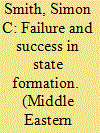| Srl | Item |
| 1 |
ID:
135345


|
|
|
|
|
| Summary/Abstract |
It is widely recognised that the Anglo-American ‘special relationship’ fluctuated following the Second World War. A “Persistent rivalry” was especially evident in policy towards the Middle East and its oil. Immediately after the war, the American attitude to Palestine seemed to complicate British policy. Events in Iran also reflected the clash between the British imperative to protect its national and imperial interests in the region on the one hand, and the American preoccupation with the Cold War and containment on the other. The subsequent differences over Egypt/ Nasser are a matter of public record as are the problems which arose over the British withdrawal from “East of Suez”. Perhaps the very closeness of the relationship between the UK and the US served to heighten expectations.
|
|
|
|
|
|
|
|
|
|
|
|
|
|
|
|
| 2 |
ID:
151844


|
|
|
|
|
| Summary/Abstract |
Despite the apparent similarities in Britain's relationship with the Sheikhdoms of the Lower Gulf and the traditional states of southern Arabia, British policy-makers pursued contrasting policies towards the two sets of territories in the era of decolonization. As regards South Arabia, Britain followed a policy of amalgamating the states into a ‘Whitehall’ federation. The fact that the Federation of South Arabia remained dependent on British backing, and in consequence became ineffably associated with British imperialism in an era of anti-colonial Arab nationalism, fatally damaged its chances of longevity. Applying the lessons of failure in South Arabia, the British were far more inconspicuous in the discussions which led to the creation of the United Arab Emirates (UAE). Indeed, the fact that the UAE essentially emerged from the initiative of Sheikhs Zaid of Abu Dhabi and Rashid of Dubai, rather than the British, was one of the key factors in its survival. By contrast, the Federation of South Arabia collapsed ignominiously once the ballast provided by the British had been removed.
|
|
|
|
|
|
|
|
|
|
|
|
|
|
|
|
| 3 |
ID:
187538


|
|
|
|
|
| Summary/Abstract |
The existing historiography on relations between Britain and the states of Lower Gulf after British withdrawal from ‘East of Suez’ in 1971 suggests that the former imperial power successfully established an informal role in the 1970s and beyond which amounted to empire in all but name. While Britain certainly sought to retain as much of its influence and as many of its interests in the economically important Lower Gulf as possible, an analysis of Anglo-Qatari relations after 1971 demonstrates that Britain’s former exclusive position was substantially eroded. British economic weakness, fierce competition from Britain’s industrial rivals, and the encroachment of the Arab world into the affairs of Qatar all militated still further against the preservation of British influence and interests, let alone the establishment of an informal imperial relationship with Qatar.
|
|
|
|
|
|
|
|
|
|
|
|
|
|
|
|